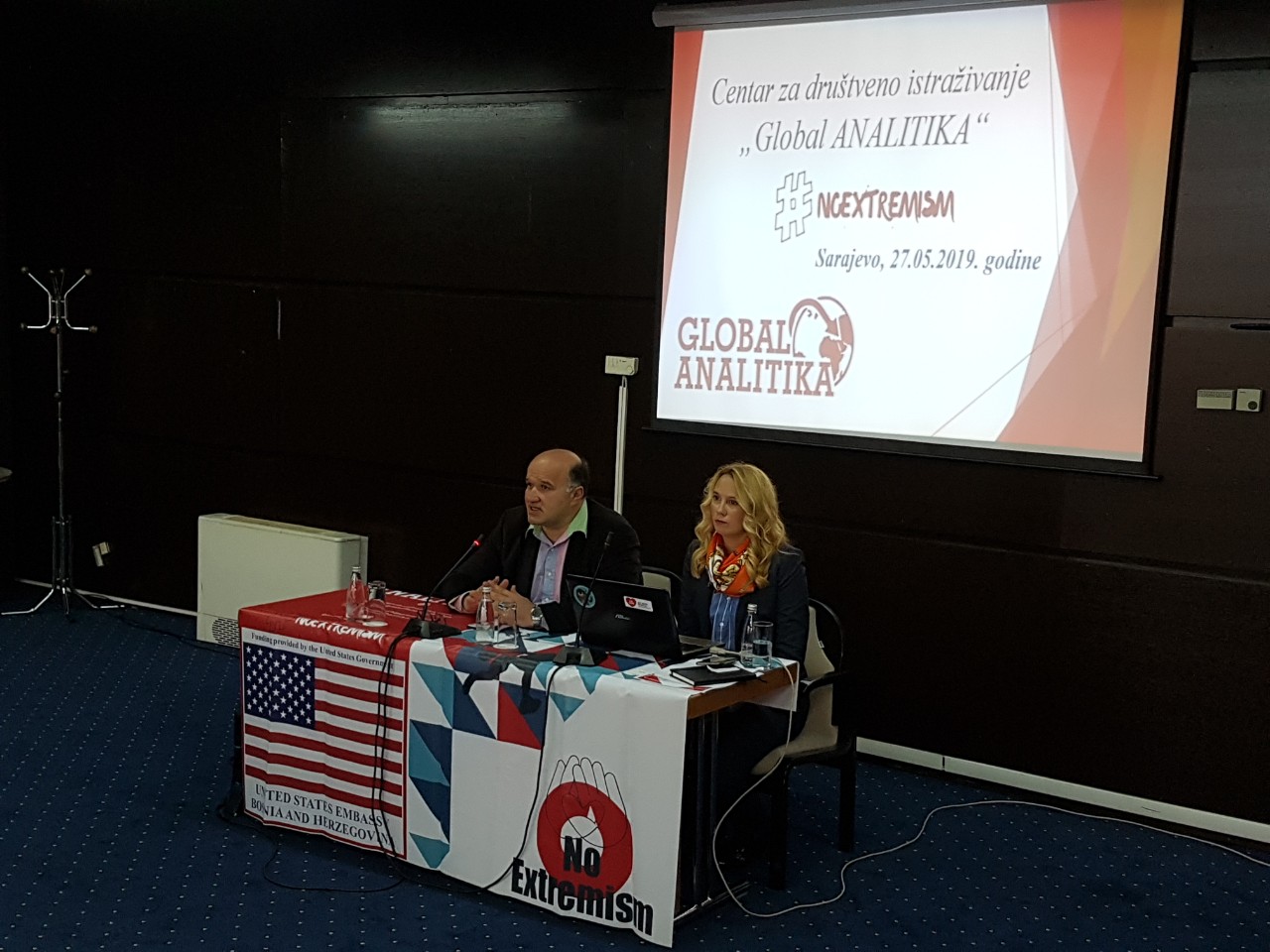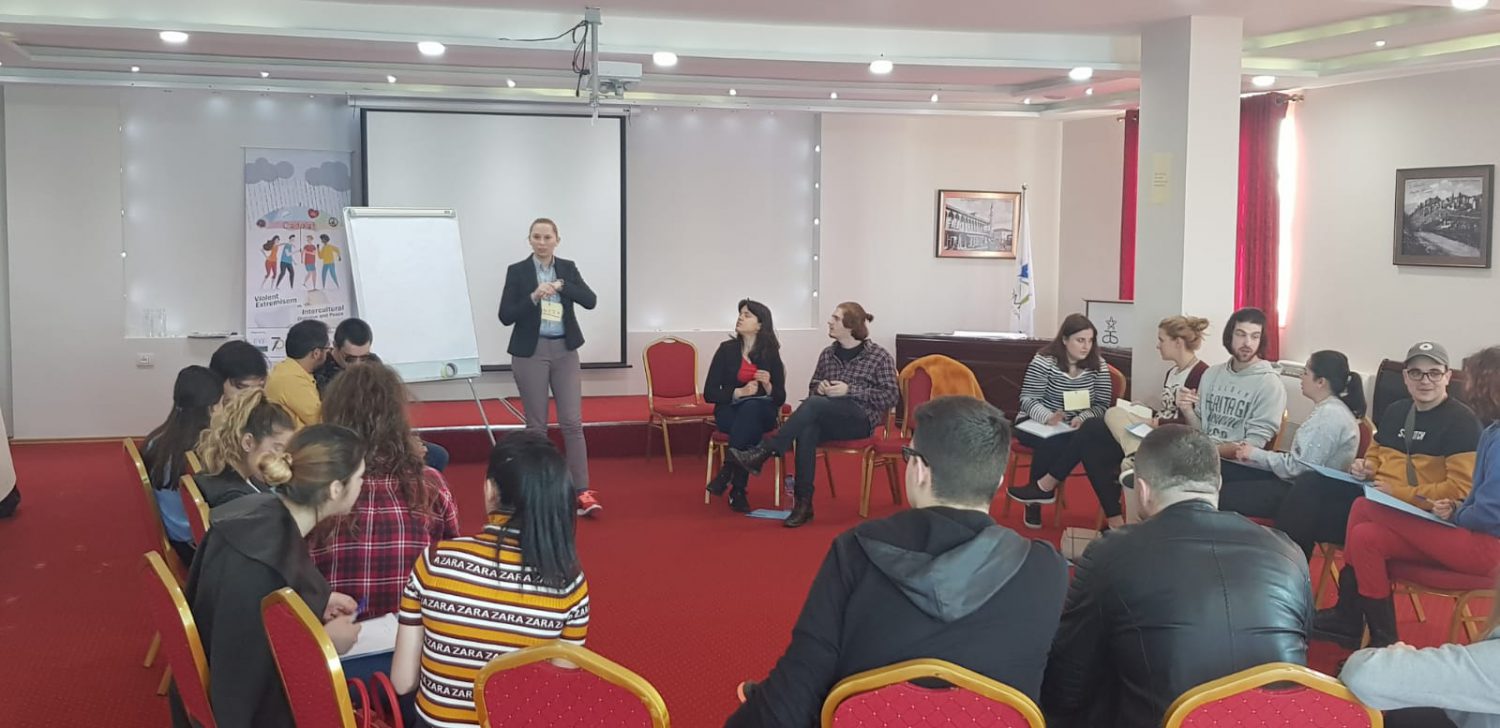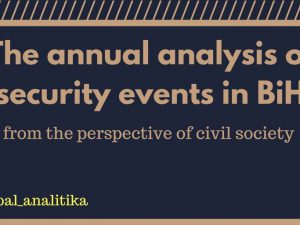Center for Social Research Global Analitika continues with its commitment to the prevention of all social phenomena resulting in violence, which includes the prevention of violence against children, women and other vulnerable categories of our society, such as cyberbullying, hooliganism and extremism. Global Analitika tries always to confirm its activities by their own research or use data from referenced and independent researchers, resulting that Global Analitika has been recognized on an international level, and supported by UNESCO, UNICEF, European Commission (ERASMUS program), The Marshall Center, the United States Embassy to Bosnia and Herzegovina, the Government of Switzerland, etc. Regional cooperation has been achieved with NGOs from Albania, Montenegro, Croatia, Bulgaria, Serbia, Macedonia, Kosovo, Slovenia, as well as cooperation with non-governmental organizations from Romania, Estonia, Portugal, Austria, Sweden, Norway etc.
The Strategy of Bosnia and Herzegovina for Prevention and Combating Terrorism in the first of four sub-goals, it envisages cooperation and support with civil society organizations on the prevention of violent extremism. Thus, one of the key priorities in the Strategy states: “Provide support to the activities of citizens and civil society organizations aimed at preventing hate and promoting positive narratives (opposing violent extremist narratives by highlighting positive examples of social values, tolerance, openness).” In recent years, the Center for Social Research Global Analitika has become a regional leader in the prevention of extremism, which is still treated as one of the most current global security challenges. Linking the negative context to the problem of extremism is due to the fact that extremism is associated with violence, and often leads to terrorism. However, the problem of violent extremism was, in some cases, overhyped, i.e. not adequately treated, both by the public and by some politicians (mostly coming from populist and right political options) in the world, including in Bosnia and Herzegovina. The problem pointed out by experts in the United States, the European Union, but also in Bosnia and Herzegovina is the emergence of “quasi-experts” and malicious commentators on the problem of violent extremism and radicalism, which by their engagement inflict long-term harm to society and beyond, and limit the results and level of success in preventing and countering violent extremism and radicalism. These “quasi-experts” knowingly exaggerate the dangers of violent extremism or bind them to a certain religious affiliation, group or even individuals, and in addition to damaging relations among citizens in Bosnia and Herzegovina and reducing the level of trust, they intentionally contribute to keeping this issue in focus on interests, and thus they give themselves the significance and have additional engagements.
By analyzing all the influences that have contributed to the unprofessional and inadequate attitude towards the problem of violent extremism in Bosnia and Herzegovina, which reduces the results on prevention, the following factors are highlighted:
- Unprofessional media reporting on the problem of extremism,
- Using the problem of violent extremism in daily political and pre-election purposes by right-wing politicians,
- Engagement and participation in the public of individuals who basically call themselves experts, even though in their career they did not deal with the problem of violent extremism in practical terms,
- Inadequate spending of funds that support the prevention of violent extremism and radicalism, by individuals from international organizations, as well as individuals from domestic organizations and institutions,
- Engagement of incompetent people by organizations implementing projects for the prevention of violent extremism in Bosnia and Herzegovina, although these people have no experience in the problem of violent extremism and similar issues,
- Inadequate use of terminology from the domain of violent extremism, both in official documents and in the media space in Bosnia and Herzegovina,
- Persistent promotion of the same collaborators and the same NGOs by the implementers of projects related to the problems of violent extremism, without taking into account the results of the work of individuals and non-governmental organizations on this issue,
- Insufficient cooperation between domestic non-governmental organizations on the one hand, and international organizations and competent domestic institutions on the other,
- Insufficient engagement and the use of experiences from practitioners who encounter cases related to extremism on daily basis (social workers, teachers, employees of security agencies).
The results of the research on the topic “Factors that negatively affect the prevention of violent extremism in Bosnia and Herzegovina”
Methodology
Quantitative methods of research were used:
Face to face interviews, with 30 experts and practitioners from all over Bosnia and Herzegovina, dealing with the issues of extremism including 10 representatives of the NGO sector, 5 representatives of social welfare centers, 5 members of security agencies who have encountered the problems of extremism, 5 young researchers and 5 teachers.
Data collection was carried out in the period from 01st August 2018 to 01st October 2018.
Key research findings
The subject of the research consists of two problem circles, where the first problem circle is the opinion of the respondents on the situation and problems in the prevention of violent extremism in Bosnia and Herzegovina. The second round refers to attitudes about the reasons and consequences of an insufficiently adequate response to the existence of violent extremism in Bosnia and Herzegovina.
More important survey questions are:
1. The prevention of violent extremism in Bosnia and Herzegovina is at a satisfactory level:
![]()
2. Lack of adequate activities to prevent violent extremism in Bosnia and Herzegovina affect the results of prevention:
![]()
3. State institutions responsible for the problem of violent extremism can do more in order to prevent violent extremism:
![]()
4. International organizations properly allocate funds to project implementers on the prevention of violent extremism in Bosnia and Herzegovina:
![]()
5. Insufficient engagement of practitioners in the problem of violent extremism affects the success of prevention:
![]()
According to the results of the research, the purpose of this analysis is to help in the planning and implementation of the activities that will be undertaken in the coming period in Bosnia and Herzegovina. These activities should be developed with the aim that all planned and current actions on the prevention of violent extremism give adequate results and that the effects of the action are felt in the local community. Center for Social Research Global Analitika will continue its professional engagement in the prevention of violent extremism and expresses readiness for open and transparent cooperation with all organizations and institutions, as well as experts and researchers dealing with the problems of violent extremism in Bosnia and Herzegovina.










